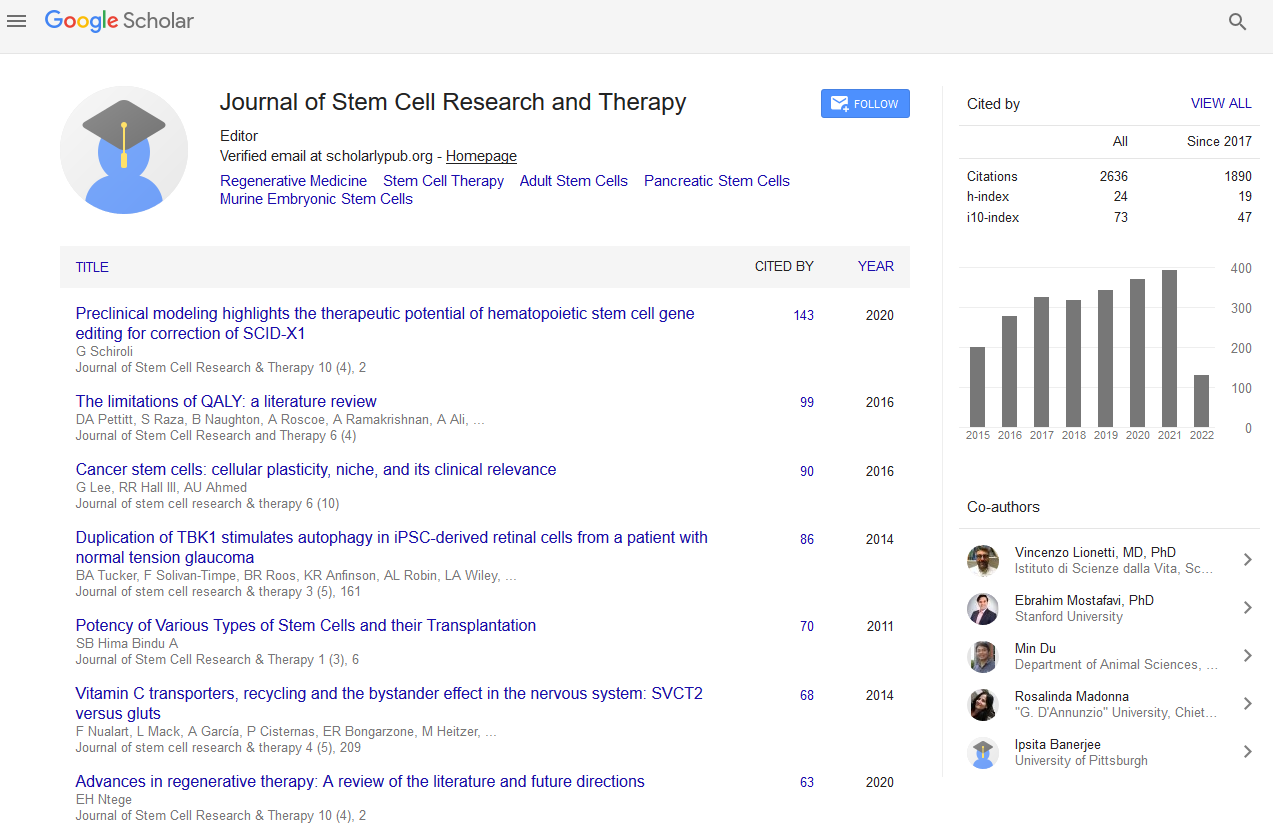Indexed In
- Open J Gate
- Genamics JournalSeek
- Academic Keys
- JournalTOCs
- China National Knowledge Infrastructure (CNKI)
- Ulrich's Periodicals Directory
- RefSeek
- Hamdard University
- EBSCO A-Z
- Directory of Abstract Indexing for Journals
- OCLC- WorldCat
- Publons
- Geneva Foundation for Medical Education and Research
- Euro Pub
- Google Scholar
Useful Links
Share This Page
Journal Flyer

Open Access Journals
- Agri and Aquaculture
- Biochemistry
- Bioinformatics & Systems Biology
- Business & Management
- Chemistry
- Clinical Sciences
- Engineering
- Food & Nutrition
- General Science
- Genetics & Molecular Biology
- Immunology & Microbiology
- Medical Sciences
- Neuroscience & Psychology
- Nursing & Health Care
- Pharmaceutical Sciences
Genetically encoded tools applying in phenotyping and toxicity test
7th International Conference and Exhibition on Cell and Gene Therapy
March 15-16, 2018 | London, UK
Yu-Fen Chang, Jiahui Wu, Qian Yong, Frances Brook, Matthew Daniels and Robert Campbell
University of Oxford, UK
University of Alberta, Canada
LumiSTAR Biotechnology, Inc., Taiwan
Scientific Tracks Abstracts: J Stem Cell Res Ther
Abstract:
Induced pluripotent stem cell (iPSC) models hold great promise for disease modeling and drug discovery. Genetically encoded light emitting reporters offer the prospect of multichannel resolution of events within subcellular compartments. The endoplasmic reticulum (ER) contains a major intracellular store of calcium ions (Ca2+). Cyclical emptying and refilling of the ER is required for many aspects of life, from the release of insulin to the beat of the heart. ER Ca2+ concentrations can be 1000 fold higher than the cytoplasm making this process difficult to directly study with existing probes or dyes which saturate at lower Ca2+ concentrations. In heart cells, the ER is known as the sarcoplasmic reticulum (SR). The SR is the predominant source of the amplifying Ca2+ induced Ca2+ release (CICR) that enables the small membrane localized voltage dependent Ca2+ entry event to lead to myofilament contraction. Contraction is inevitably associated with micrometer scale motion of the SR, and hence, ratiometric (as opposed to intensiometric) imaging approaches are necessary to correct for movement artefacts. Here, we report development of a series of ratiometric and non-ratiometric low affinity red fluorescent Ca2+ indicators targeted to the ER/SR and demonstrate their application in cultured cardiomyocytes. We shall also demonstrate combing use of optogenetic tool with red shift calcium indicators, R-GECO or K-GECO, in cardiac toxicity test and drug screening.
Biography :
Yu-Fen Chang has completed her PhD from Life Science in Hokkaido University and been awarded the Japanese Society for Promotion of Science (JSPS) fellowship . She has finished postdoctoral studies from Radcliffe Department of Medicine in University of Oxford and published more than 25 papers in reputed journals. She currently is the research director of LumiSTAR biotechnology, Inc.
Email:chang.candece@gmail.com


